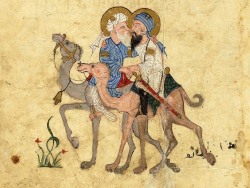LGBT in the Quran

25 August 2019 - GALE added an article on sexual diversity in the Quran to the database. You can often get questions or comments from Muslim students about homosexuality in Islam. They generally claim that homosexuality is banned by the Quran. But if you continue to ask, they often do not know the statements and they get stuck in "it is just not allowed, it is haram" .
It is true that there are a number of passages in the Quran referring to the story of Sodom which seem to prohibit sex between men. But there is more to say about it.
Quotes from the Quran: liwat
The Quran mentions sex between men several times, almost all of them in the context of the story of Sodom and Gomorrah, in which after the city inhabitants demand sexual access to the messengers sent by God to the prophet Lot (or Lut). The Quranic story is almost the same as the version in the Bible. Later explanations of the Quran agreed that the "abomination" alluded to by the Quranic passages was attempted sodomy (specifically anal intercourse) between men. The sins of the people of Lut later became proverbial and the Arabic words for the act of anal sex between men such as “liwat” and for a person who performs such acts “Luti”; both derive from the name Lut, although Lut was not the one demanding sex. Some modern gay and lesbian Muslim activists disagree with the equation of this rape story with homosexual relationships.
Lesbian sex
There is no clear prohibition of sex between women in the Quran. Some exegetes think it is “zina” (the punishable crime of sex outside of marriage, but other say can be seen as a sin but not as a crime that deserves a religious (hadd) punishment.
Transsexuality
Transgenderism does not occur in the Quran. There are convictions of effeminate men (possibly eunuchs) and "women who imitate men" in the Hadith. Allegedly, Mohammed banished effeminate men, but did not kill them because they were also believers. In Islam there is a debate about whether transgender people imitate the opposite sex (which is considered reprehensible) or whether they are in the wrong body. Ayatollah Khomeini issued a fatwa in 1987 authorizing sex operations. Nevertheless, Muslim transgender people in most Muslim countries (including Iran, even though they can get operations) still suffer from discrimination.
Different opinions
Scholars point out that Muslims' views on sexual diversity have become much more conservative in the last century, while Islam has for centuries been much more tolerant than Christianity. In addition, colonialism and opposition to Western exploitation has created a general reluctance against many things that Muslims consider Western (and corrupt). Homosexuality is then used as an argument to show how corrupt the West is.
Educating about sexual diversity and Islam
Gay, bisexual and lesbian Muslims have become increasingly visible in recent years. They often say that we should not condemn each other that way and that Allah himself has created diversity.
In information provision, teachers and advisers must think carefully about the position from which they are doing this. If you are a Muslim yourself, you have a very different position than if you have a different belief or do not believe. And then the choice of whether or not to comment on the Quran and other Islamic regulations is not self-evident. You can only do that if you know are an expert on Islam. Even then, make sure not educate with a judgmental view of Islam. For non-Muslim teachers and activists we recommend not to get drawn into a religious discussion but to enter into a dialogue about democracy and how we can live together while dealing well with differences.
Source: Database article


